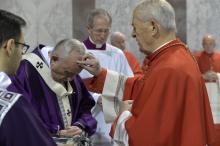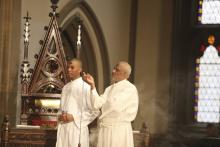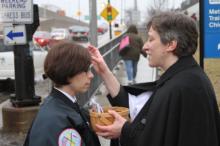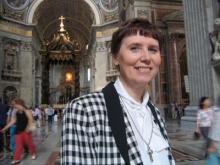A collection of photos that defined 2021.
ash wednesday


I’m latecomer to Lent. It wasn’t until I joined Sojourners in my first role as senior political director in 2004 that I learned from my Catholic colleagues the significance of this 40-day liturgical season in which we spiritually travel with Jesus through his fasting in the desert. In 2021, this time of reflection — so often marked by what we give up — comes amid what already feels like a dark, cold, and perilous winter.

Lent is always a solemn period of penance, reflection, and prayer, but this year that reflection is different. Though vaccinations are on the rise, the virus has killed nearly 500,000 people in America and forced many more into isolation. For many Christians, Lent in 2021 has also taken on a new significance beyond the requirements of social distancing.

ON ASH WEDNESDAY the dust from which we came and to which we return is daubed on Christians’ foreheads. It is an intimate reminder that the Spirit of God breathes in us and we live; without the Spirit we crumble.
To be more Christlike means facing death in all its forms—the death of reputation, the death of truth, and the bodily death of our beloveds. Lenten scriptures keep before us stories of temptation, failure, and the heavy machinery of this empire or that, always shifting into position to crush those who threaten human power and wealth. There are hints of resurrection in the lectionary readings, but the pain and destruction of dreams and life that comes before is given its full due.
We are too well acquainted with the world and its ways not to imagine what massacre or plague filled that valley with dry bones in Ezekiel’s vision. And, in John’s gospel, Jesus is confronted by Lazarus’ grieving, accusing sister. Why did you not come when called? Mary demands, while Lazarus was alive and could be healed. The story is raw with the pitch of her rage and Jesus’ own tears.

Timing is important. Sometimes timing is everything. That may be true now with the likely release of Special Counsel Robert Mueller’s report on President Trump and his campaign’s possible coordination with Russia during the 2016 election season and potential obstruction of justice. It seems the report is likely to be delivered to Attorney General William Barr during the Christian liturgical season of Lent. This Lent a group of Christian elders have issued a pastoral letter calling for “prayer, fasting, and action,” all of which are appropriate for the Lenten season but are also particularly well timed this year to anchor us for a potential national and even constitutional crisis.

On Ash Wednesday 2018, a group of elders met for a retreat together because of a national political crisis, which was also revealing a crisis of faith. At Pentecost, in overcrowded churches in downtown Washington, D.C., we launched a declaration that we called Reclaiming Jesus: A Confession of Faith in a Time of Crisis. More than 5 million people have directly responded to the Reclaiming Jesus declaration thus far and many more have been reached by it and are addressing the declaration in their churches. A declaration is becoming a movement to re-claim Jesus; the message of Jesus needs reclaiming at a time like this.

A high school shooting. 17 dead.
Angry white man. Assault rifle.
Broken community. Candle-lit vigils.
Grief. Rage. Hearts. Crosses.

Pope Francis, leading Catholics into the season of Lent, urged people on Wednesday to slow down amid the noise, haste, and desire for instant gratification in a high-tech world to rediscover the power of silence.

“What are we going to do — put this out under the theme, ‘I love you; I’m sorry’?” he said he joked with church members. “But the more I thought about it the more I thought sometimes when something is odd or uncomfortable the best thing to do is to lean into the discomfort.”

Valentine’s Day, in fact, originated as a liturgical feast to celebrate the decapitation of a third-century Christian martyr, or perhaps two. So, how did we get from beheading to betrothing on Valentine’s Day?

It’s because of the tendency to forget our First Love — to rely on emotions and feelings instead of true sacrifice and commitment — that we need Ash Wednesday this Valentine’s Day.

We are steeped in a culture that celebrates endless work and the denial of one’s own health. Christian faith leadership demands a counter-witness. Ministry life should reflect a theology of service and commitment both to God and other people, but it should also embody healthy balance and spiritual sustainability for the long work of learning faith and reflecting God’s grace to a world hungry for it.

To adults new to Christian practices of fasting during Lent, the idea can seem facetious — some sort of trendy way of worshipping both Jesus and our own well-defined abs. But for many, fasting has been a way of cleansing not the body but the mind. Temporary self-denial can invite us to compassion for those who are hungry not by choice, to a remembrance of the trials of Jesus, or to better appreciation of food when we do eat. But in the face of a world that already pressures many into self-denial, self-deprivation, and self-harm, the strength of the spiritual discipline of fasting cracks.

“You are dust, and to dust you shall return.” Every year on Ash Wednesday, I seek out some member of the clergy to say those words to me. They come from the curse of mankind in Genesis 3, but I find blessing in hearing them in the tale of the loving purposes of God.
1. Because Extreme Cold Always Brings Climate Deniers Out of the Woodwork …
Bill Nye, yep, the Science Guy, offers the media this helpful prompting: “‘Let’s not confuse or interchange climate change with global warming,’ noting that when the climate changes, ‘some places get colder.’”
2. After the Copenhagen Synagogue Shooting, This Muslim Community Is Responding in the Best Way Possible
“Islam is about protecting our brothers and sisters, regardless of which religion they belong to. Islam is about rising above hate and never sinking to the same level as the haters. Islam is about defending each other. Muslims want to show that we deeply deplore all types of hatred of Jews, and that we are there to support them.”
3. Afghan Civilian Deaths Hit Record High
2014 was the deadliest year on record for civilians in Afghanistan, according to the U.N. Total civilian casualties jumped 22 percent from 2013.
4. Ash Wednesday: To Be Seen
“… revelation does happen and ... we see. We see that we have always been seen by God. God holds us and beholds us even when it can be so hard for us to hold and behold God.”

Lately, a particular quote has been wending its way around Facebook, popping up in the feeds of the most disparate names on my friends list. It appears written in feminine cursive script or blocky varsity letters or etched under a photo of leaping flames: “May the bridges I burn light the way.”
The words seem significant on Ash Wednesday, the first day of Lent, when ministers mark a believer’s forehead with a sign of the cross — two simple finger strokes drawn as a reminder of the impermanence of this world and our own mortality. The imposition of ashes is often accompanied by words from Genesis 3:19: Remember that you are dust, and to dust you shall return.
Lent is the season of reflection, reevaluation, reconciliation, and — here’s a hundred dollar Christian word — repentance. For many, the word “repent” calls to mind a red-faced TV preacher banging a hammy fist on the podium, or a guy in a sandwich board, standing on a corner yelling through a bullhorn about the fires of hell and the threat of damnation. YOU MUST REPENT!
But repent means, in the most literal sense, to turn in a different direction. It is less about avoiding being struck down by God than embarking on our own particular course-correction.

Chances are you’ll see a bunch of folks walking around with shmutz on their foreheads this Wednesday. The ‘Splainer asks what having a dirty forehead has to do with being a Christian and why this ritual is gaining in popularity.
Q: Excuse me, but why do you have dirt on your forehead?
A: Wednesday is Ash Wednesday, the day many Christians mark as the first day of Lent, the time of reflection and penitence leading up to Easter Sunday. Clergy all over the world dispense ashes, usually made by burning the palm fronds distributed on last year’s Palm Sunday, making the sign of the cross on the bowed foreheads before them. As they “impose” or “dispense” the ashes, the pastor or priest reminds each Christian of Genesis 3:19: “For dust you are and to dust you shall return.”
Q: Well, that’s cheerful. Why would anyone want to start a workday on such a downer?
A: It isn’t intended to be a downer. It’s supposed to be a reminder that our lives are short and we must live them to the fullest. OK, maybe it’s a little bit of a downer — that verse from Genesis is what God said to Adam and Eve when he expelled them from the Garden of Eden for their sins. But there’s a big party the night before Ash Wednesday. That’s Mardi Gras, or “Fat Tuesday,” a secular observance that evolved out of “Shrove Tuesday,” the last hurrah – usually marked by eating of pancakes or other sinfully sweet foods – before the solemnity and penance of Lent set in.

ROME — On its 15 previous pilgrimages, the Catholic gay rights group New Ways Ministry drew maybe two-dozen people to visit holy sites in places like Assisi and Rome.
This year, the number of pilgrims unexpectedly doubled to 50.
Chalk it up to the so-called Francis Effect, where the pope’s open-arms acceptance is giving new hope to gay and lesbian Catholics who have felt alienated from their church for decades.
What’s been even more surprising is that both New Ways and a similar Catholic LGBT organization in Britain are finding support from the Catholic hierarchy in their efforts to meet the pontiff when they both visit the Vatican on Ash Wednesday, the start of Lent, the period of penance and fasting preceding Easter.
For example, Archbishop Georg Ganswein, head of the papal household and the top aide to Pope Emeritus Benedict XVI, responded to New Ways’ request for a papal meet-and-greet by reserving tickets for the group at Francis’ weekly public audience in St. Peter’s Square. It’s not a private meeting — which is tough for anyone to get — but it’s not nothing.

Seven years ago this week, I had my “come to Jesus” moment.
That’s not to say that over the past few years I haven’t had many experiences in which I’ve come away wondering “did I ever really believe up until now?” Many of those moments were far more profound and life-changing. It’s just that for me, it’s where a certain chapter of my life began.
I was raised in a Christian tradition that prized altar calls and bowing your heads, closing your eyes, and raising your hands to be saved. There was a clear delineator of when you were “born again” and when you were not. It was a moment in history, not just a spiritual exercise.
I don’t totally disagree. I think that there is something significant about the moment you first say yes, the same way I can remember the first time my best friend and I stopped just being colleagues. Our friendship has had many more important moments, but going to see Alice in Wonderland after work on a rainy Monday evening in March was where it started.
But as I have persisted (persevered for you Calvinists) in this faith I’ve discovered more and more what a relationship with God is like. In order for it to work, as Martin Luther famously said, all of life must be repentance. Every day the choice to say “yes” and not “no, I’m so done with this” is just as significant, if not more because coming to Jesus is often easier than staying.

Even the winter won’t last forever. We’ll see the morning, we’ll feel the sun.
We’ll wake up in April, ready and able, Sowing the seeds in the soil.
Even the darkness cannot disarm us. We’ll see the morning, we’ll feel the sun.
-Audrey Assad
Easter is what many would argue to be the quintessential turning point of the Christian faith. The crux. The climax of the story. The thing that you must be able to articulate into carefully formed sentences depicting your belief, as though words and theology solely define your spirituality and very existence. Perhaps from all of this lies the basis for the trite messages that I, along with so many others, have heard about the Christian faith. “Jesus died for your sins.” “Jesus paid the debt.” “Jesus stood in your place and died for you so that you might have life.”
And if those words bear truth and meaning to you, I have not come to take them away, nor discredit them.
It’s just not the Jesus I’ve come to know, face-to-face in my human spiritual struggle.